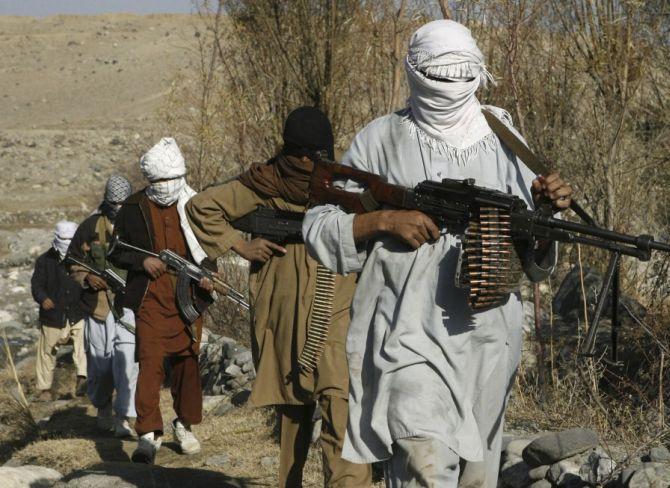 The freeze in United States security aid to Pakistan will continue as it is yet to take any decisive action against the Taliban and the Haqqani network.
The freeze in United States security aid to Pakistan will continue as it is yet to take any decisive action against the Taliban and the Haqqani network.
"That's the current posture. And I would imagine, hopefully, in the future, well have an opportunity to (review)," General Joseph Votel, Commander of the US Central Command, told members of the Senate Armed Services Committee when asked about the future of freeze of American security assistance to Pakistan.
"So, we remain in a posture of discontinuing that support (to Pakistan)," inquired Indiana Senator Jim Banks.
Votel said the US has started to see an increase in communication, information sharing and actions on the ground in response to specific US requests.
"These are positive indicators," he said, adding that "however, ongoing national counter-terrorism efforts against anti-Pakistan militants throughout the country have not yet translated into the definitive actions we require Pakistan to take against Afghan Taliban or Haqqani leaders,"
"This problem is compounded by increasing cross-border terrorist attacks and fires between Pakistan and Afghanistan, which hinders both countries abilities to coordinate on border security," Votel said.
The US, he said, has preserved its valuable military-to-military relationship with Pakistan and attempted to increase transparency and communication with influential military leaders, while pressing its serious concerns about the country's provision of sanctuary and support to militant and terrorist groups that target the US personnel and interests.
"Achieving long-term stability in Afghanistan and defeating the insurgency will be difficult without Pakistan's support and assistance," he said.
Although most security assistance for Pakistan is currently suspended, since 2002 Pakistan has been among the largest recipients of US provided Foreign Military Financing and International Military Education and Training, the general said.
He said to date Pakistan has also been reimbursed hundreds of millions of dollars in Coalition Support Funds for counter-insurgency operations that support US security objectives in the region.
The US uses ground and air routes in Pakistan to deliver materiel to Afghanistan, he said, adding that "we also have options to utilize routes through the other Central Asian nations".
Responding to a question from Senator Banks, Votel said the pressure that the Trump Administration has put on Pakistan has contributed to the recent seen positive response from Islamabad.
"I think what is also working right now is the approach that we have in place with them. I think we have tried to be very clear in terms of the things that we Pakistan to do for us. And what I have endeavoured to do -- not always in a public way, but in a private way -- is develop a relationship that allows us to provide feedback both ways," he said.
There are things, frankly, that Pakistan has asked from the US as well, he said. "So this is a two-way street here. It is my responsibility to make sure that we have feedback loops in place that go back and forth between the things that were doing to try support each other and moving forward in that regard."
He said it was important to recognise that Pakistan as a country has suffered greatly from terrorism, "perhaps as much as anybody in the region, or maybe as anybody around the world". "They have taken a number of measures to address terrorism within their borders," the general said.
"That has contributed, over the years, to some increased security in the area. And we have to recognise at up front. So our approach is to continue to be engaged with them. We want to have a candid discussion. We want to have frequent communication. We want to build trust in this relationship," Votel said.
US says India, Pakistan would have to sit and talk on border tension
India and Pakistan need to sit and talk about their ongoing border tension, the Trump Administration said.
"We think that both sides would certainly have to sit down and have talks about that," State Department spokesperson Heather Nauert told reporters at her daily news conference.
She was responding to a question on what role the US can play to ease down the tensions between the two neighbouring countries.
The Indian and Pakistan issue was also raked up by a top American general at the US Congress.
"The enduring tension between the nuclear powers of India and Pakistan remains unreconciled," General Joseph Votel, Commander of the US Central Command, said in his testimony before the Senate Armed Services Committee.
'Taliban doesn't seem to be ready for peace talks'
The Taliban as this point of time does not seem to be ready for peace talks, Nauert said, asserting that any such talks have to be "Afghan-led and Afghan-owned".
In a way, the Trump administration, ruled out direct talks with the Taliban, which was being sought by the terrorist outfit in a letter to the US.
"We certainly saw this letter and are aware of this letter. Any peace talks with Afghanistan have to be Afghan-led and Afghan-owned. That has long been our policy," the spokesperson said.
She said that the Taliban, "unfortunately", does not seem ready at this point to sit down and have conversations about peace talks.
"We hope eventually they will, because that is the best way to be able to have peace in Afghanistan," Nauert said responding to a question on the letter released by the Taliban.
"Ultimately, we don't see there being a military solution to the situation in Afghanistan. Ultimately, it has to be a political situation," she said.
"That can best be done," she said if the Taliban was willing to sit down and have talks.
"Certainly the United States could have a role in that. But that's really up to Afghanistan, but it has to be Afghan-led and Afghan-owned," Nauert asserted.











